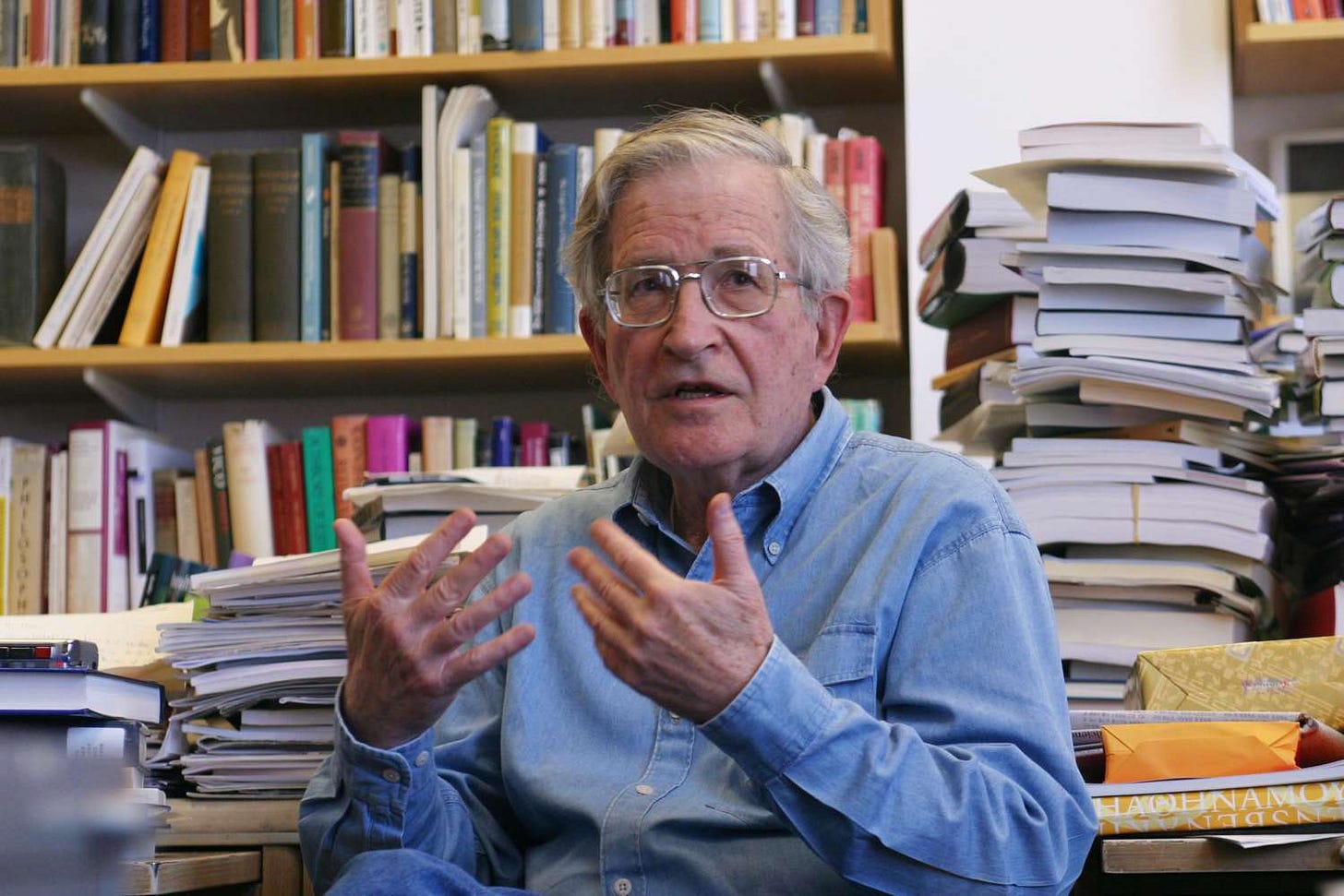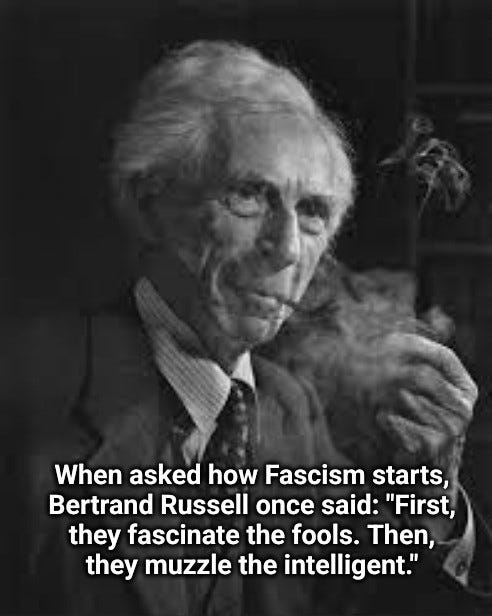"The smart way to keep people passive and obedient is to strictly limit the spectrum of acceptable opinion but allow very lively debate within that spectrum. That gives people the sense that there's free thinking going on, while all the time the presuppositions of the system are being reinforced by the limits put on the range of the debate."—Noam Chomsky
Linguist and public intellectual Noam Chomsky’s quote critiques how group discourse is controlled by shaping the boundaries of discussable topics and acceptable opinions, thereby maintaining social and ideological control.
Authorities ensure that debates stay within certain limits, preventing challenges to the fundamental structures and assumptions of the system. This method is more sophisticated than outright suppression because it allows lively discussions within set parameters, creating an illusion of free thought and democratic discourse. However, since these debates don't extend beyond the accepted limits, they reinforce existing power structures and ideology by stifling big-picture and heterodox thinking.
For example, media and political discourse often focus on a narrow range of issues and narratives, avoiding deeper systemic critiques. In social groups, certain topics or questions are considered too impolite to bring up. In academia, certain areas of research and ideas are taboo and not funded and published.
Read: "An Existential Threat to Doing Good Science" by biology professor Luana Maroja
.
The Unitarian Universalist Church is a case study of the narrowing of thought and expression
The Unitarian Universalist Church is a compelling case study of the shift from a free-thinking to an increasingly narrow-minded institution.
Unitarian Universalism has been a liberal, non-creedal church that embraced diverse viewpoints, the free exchange of ideas, and vigorous debate. However, in recent years, the national church has been overtaken by political activists aiming to transform the church into a collectivist movement by undermining individualism, free-thinking, and free expression. The following are some ways it does this:
Censorship and information control
The leadership of the Unitarian Universalist Association (UUA) in Boston controls church communications and actively restricts and censors the official information available to congregations and members. UU World, the church's official publication, has discontinued its letters to the editor section and openly stated that it will only publish articles that support the new ideology. As a result, congregations and laity receive only one-sided and biased information from the UUA.
Demeaning of freedom of expression and belief
As proponents of collectivism and identitarian postmodernist ideologies, UUA leaders and ideologue ministers promote the view that individualism, freedom of expression, and viewpoint diversity are harmful and oppressive. The UUA endorses Robin DiAngelo’s "White Fragility," which pathologizes disagreement and critical thinking.
Leaders and ideological ministers and activists use slippery slope scare tactics by claiming that allowing freedom of expression and beliefs would force the UU congregations to welcome and platform Nazis. Some leaders and ideological ministers assert that freedom of speech is a “right-wing” concept and that laity only advocate for freedom of speech and belief so they can express bigoted, right-wing ideas in congregations. A few prominent ministers and UUA leaders have suggested that congregations ask heterodox thinkers and liberal religion supporters to leave their congregations.
Attacks on dissenters and defaming of dissent
The UUA has punished and even disfellowshipped outspoken dissenting ministers, demonstrating to other ministers that questioning the new orthodoxy is not only disallowed but punishable.
Ideologues, including some UUA leaders and ministers, defame all dissenters and any dissenting arguments as racist, transphobic, gadflies, trolls, rightwing, untrustworthy, and “bad faith arguments.” This strategy of outright demeaning people and arguments as necessarily bad and morally corrupt is used as an excuse to automatically dismiss other viewpoints, and to teach UUs to be similarly dismissive.
Read: The Dangers of Demonizing Opponents
Read: Logical Fallacies: What they are and why people use them
Limiting the scope of discussion in forums
The national UU offers forums for discussing various church and UU topics. However, as Chomsky talked about, the range of permissible discussion is very narrow, and posts that go outside or question the fundamental assumptions of the discussions are removed. In UU social media forums moderated by UU ministers, dissenting posts and topics are subject to ad hominem attacks and removal, with the posters often banned.
After an entire topic of discussion was removed from a national forum by the moderating UU minister because the minister disagreed with an argument, a congregant wrote, “I think it is unfortunate that a UU minister should have these attitudes. You disagree with the arguments, but rather than refuting them, you simply seek to remove them from discussion, as 'out of covenant.' You seem to have fundamentally illiberal attitudes on freedom of speech, which is unfortunate for a minister in what has traditionally been a liberal religion.”
.
At congregations
Congregations vary, but the stark narrowing of allowable ideas and expressions have also appeared at many congregations. The following are causes:
New ministers bringing socio-political dogmatism and illiberalism
Many newly fellowship ministers have been selected and indoctrinated by the UU seminaries to be socio-political activists, and ministers are tightly controlled by the Ministerial Fellowship Committee (MFC) and the Unitarian Universalist Ministers Association (UUMA). Ministers who privately disagree with the orthodoxy know that dissent will hamper their job prospects and can even end their careers.
As a result, ministers often come with a UUA ideological and political agenda and have been taught to stifle dissent and avoid platforming diverse ideas. They often have not been taught to understand or appreciate concepts such as classical liberalism, polity, and liberal democracy.
Congregations platforming only the UUA agenda
Many congregations, through their ministers and leadership, promote only the UUA agenda and information, excluding alternative views. When congregants request the distribution of more diverse opinions, they are often rebuffed. Many leaders view their congregations not as independent and self-determining but as franchises of the UUA. This practice can be ideological but is often simply organizationally habitual.
The result is these congregations, which are supposed to be non-creedal and pluralistic, have, for all practical purposes, an orthodoxy.
Lack of platforms for open discussion and expression
Many congregations do not provide platforms or mechanisms for members to express their views and concerns to the congregation. Formal discussions are often tightly controlled and stick to narrow topics. Those who attempt to voice heterodoxy and disseminate important information, such as through emails to congregants, have faced punishment and even expulsion. Many congregants have been forced to form discussion groups and forums outside their congregations.
Congregational cultures
Many congregations have grown ideologically and politically homogenous and conflict-avoidant, prioritize community peace over all else, and have forgotten what is religious liberalism in practice. A longtime UU said that conflict avoidance and suppression of dissent go hand in hand.
Read: When Liberal Congregations Are Liberal in Name Only
.
What to do about all this
It is important to stand up for freedom of belief and speech. It is essential to call out illiberal techniques such as ad hominem attacks, censorship, and demeaning of freedom of thought, and to explain to congregations and UUs the importance of viewpoint diversity. Speaking up, bucking the system, and finding other ways to express oneself are crucial actions. By calling out suppressive techniques, as I am doing here, we can challenge groupthink and the trends of illiberalism.
Read: The Importance of Viewpoint Diversity in Organizations






As a voluntary side project to a larger settled ministry, I had helped restart a UU fellowship and then served it for 25 years only to be declared "out of covenant" for refusing to suddenly upgrade my simple "letter of covenant" to the onerous 18,000-word UUMA Code of Conduct. Though emeritus there, they then stopped sending me their electronic newsletter. They didn't want me commenting on the UUA's push to install their ministers and agendas. Most local UUs don't even know of this growing UUA/UUMA scandal. I'm disgusted with what I once championed.
I completely understand. Whenever I discussed topics that others didn't already agree with, I was often ignored or pathologized. Some people would respond, but others allowed me to talk excessively without warning me that I might get into trouble. I've realized that part of my speech pattern is due to a condition called cluttering, where I speak without thinking and often need to repeat myself. This became especially clear after I started using ChatGPT and saw how much I had been manipulated. I discovered that topics I was not supposed to discuss at church could be openly talked about with strangers, as well as in my other volunteer organizations and work, without receiving negative responses or silence. I was being isolated because of my speech disorder. While I could talk about the disorder at designated times, outside of those times, I was not truly listened to. I was expected to remain silent, not ask for help with anything I was struggling with, and not show any kind of emotional or physical pain. (used Chat GPT proofreading because of cluttering)